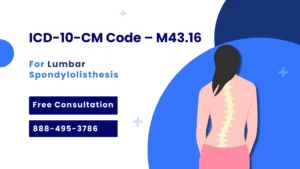In medical billing, an entity code is like a unique label identifying who’s sending the bill for healthcare services. This code is crucial because it helps everyone – the healthcare provider, billing office, and payer – know who is in charge of the billing. If you mess up the code, you might end up billing the wrong party, causing issues with Medicare and Medicaid.
Each group involved in healthcare – like the doctor’s office, the billing folks, and the insurance company – has its unique code. It’s super important to use the right one when sending out bills. If you’re not sure which code to use, don’t worry. You can always ask for help from the healthcare provider, billing entity, or insurance company. Now, let’s talk about why getting this code right is so important and how it can help avoid problems in the world of medical billing and coding. Check out the blog for all the details!
What is an Entity Code in Medical Billing?
An entity code, or National Provider Identifier (NPI), is a distinct identification given to healthcare providers by the Centers for Medicare and Medicaid Services (CMS). It’s a five-digit number serving to identify providers for billing and administrative needs uniquely. The NPI, introduced in 2007, took over from the outdated Provider Identification Number (PIN) system.
This standardized identifier is universally employed by healthcare payers such as Medicare, Medicaid, and private insurers for seamless provider recognition in billing and administrative procedures. Using Entity Codes for Medicare ensures accurate communication between healthcare providers and insurers, reducing errors in the billing process.
What is the Importance of an Entity Code?
1- Accurate Claims Processing
Entity codes for a billing entity play a crucial role in ensuring that health insurance claims are handled correctly. When a healthcare provider submits a claim, the insurance company uses the entity code to confirm that the provider is legit and should be paid for the services rendered. This helps prevent errors and ensures that payments go to the right place, improving the efficiency of the claims processing system.
2- Identification of Doctors
Entity codes for Medicare are like ID cards for healthcare providers. They help in quickly figuring what’s a entity in the healthcare world. When doctors, hospitals, or other healthcare folks have their unique entity codes, it becomes straightforward to identify and communicate with them. This identification is vital for the smooth coordination of patient care and ensuring everyone is on the same page.
3- Regulatory Compliance
The Health Insurance Portability and Accountability Act (HIPAA) has rules, one of which is about using standardized identifiers, like entity codes, in electronic transactions. This isn’t just to complicate things; it’s to keep health information secure and ensure everyone follows the same rules. Using the right entity code on a medical claim helps healthcare providers stick to these rules and avoid trouble.
What is the Result of a Minor Entity Code Error?
Fixing mistakes with entity codes on medical claims is a tough job for medical billers. This is because it’s not always clear what the problem is, and it takes a lot of time to figure it out. As a result, billers often need to meet the deadlines for sending and appealing claims to insurance companies. This causes healthcare professionals to lose money, hurting their overall income. The issues with entity codes for mrdicare are a big challenge in the healthcare billing process.
What are the Entity-related Errors for Medicare?
1- Patient Identification ID
When there are inconsistencies with the patient’s Member ID in coding or claims, it often signals missing details related to the patient. It can often lead to entity code rejection. This problem may stem from patient insurance changes, rendering them uncovered on the service date. Alternatively, the error may indicate a mismatch between the patient’s ID and the system. Correct data entry into the claim is crucial to resolving this issue.
2- Improper Clients’ Demographic
Medical billing companies play a vital role in providing accurate patient demographic data. These companies gather precise information from payers to prevent errors in entity that is sending the claim to the payer. They can take corrective measures to ensure accurate claim processing by pinpointing the unidentified ID.
3- Unknown ID
The occurrence of an Unidentified ID error necessitates the use of an entity code. Medical service providers can address this issue by carefully inspecting each box on the claim to identify the entity causing the problem. They can take corrective measures to ensure accurate claim processing by pinpointing the unidentified ID.
Any Solution for Errors in coding and claim?
Entity code rejection in medical billing happens when there are errors related to the identification of your healthcare provider. To avoid these errors:
- Ensure the insurance company has the correct National Provider Identifier (NPI) and Tax ID for your medical provider.
- Before submitting claims, review the information to catch any entity code errors.
- If you need help finding the issue, contact the insurance company directly to get more information.
- Inform them that you’ve sent the medical claim electronically.
- Double-check patient demographics if there are errors, especially if a claim is denied.
- If a claim denial is due to a recently added patient, contact the insurance payer to confirm the patient is active under the policy.
After resolving all issues and making necessary corrections, insurance companies can validate claims and resubmit affected ones. Dealing with denied claims is challenging for healthcare providers.
Final Thoughts
Entity codes for insurance billing serve as identification numbers for healthcare providers. They help ensure everything is correct when you submit your medical bills and follow the guidelines. Healthcare providers must have a unique identification number known as an NPI. This makes billing and receiving paid for your services run more smoothly. If you are a healthcare provider and want to know where is the entity code on 1500 form, please contact one of our billing managers for a quick chat. They can explain everything in simple terms.
If you are a healthcare provider seeking an enhanced billing cycle, you’ve come to the right place. Contact us today for comprehensive medical billing and coding services.




